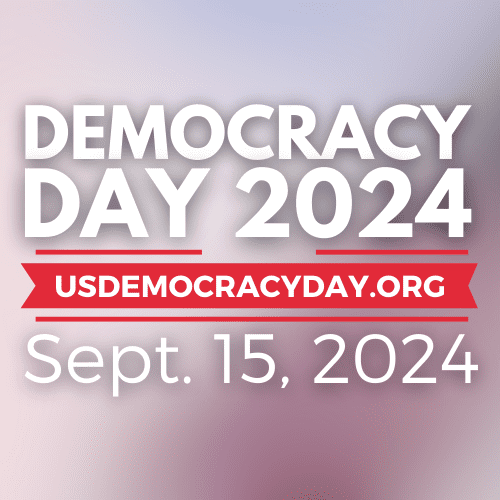South Dakota’s all-Republican congressional delegation, from left: Sen. John Thune, Rep. Dusty Johnson and Sen. Mike Rounds. (Photos courtesy of Thune/Johnson/Rounds offices; composite by South Dakota Searchlight)
South Dakota’s three members of Congress scored poorly on a watchdog group’s new Democracy Scorecard, which evaluates congressional positions on democracy-related bills and resolutions.
Common Cause is a nonpartisan, nonprofit organization in Washington, D.C. It was founded in 1970 by Republican John W. Gardner, “the father of campaign finance reform” and President Lyndon Johnson’s secretary of health, education and welfare.


This article is part of U.S. Democracy Day, a nationwide collaborative on Sept. 15, the International Day of Democracy, in which news organizations cover how democracy works and the threats it faces. To learn more, visit usdemocracyday.org.
The organization’s 2024 scorecard gave South Dakota’s Republican Senators John Thune and Mike Rounds zeros out of 10 — zero meaning they took no pro-democracy positions on legislation analyzed by the organization— and Republican Rep. Dusty Johnson one out of 13.
Johnson’s one point reflects his vote to expel Rep. George Santos, R-New York. Common Cause said removing the representative for ethical violations was pro-democracy because it upheld accountability and integrity within the legislative body, ensuring trust in U.S. institutions.
None of the spokespeople for South Dakota’s congressional delegation offered a comment on the scorecard when contacted by South Dakota Searchlight.
No Republican scored greater than a two on the scorecard, and no Democrat received less than a seven.
Common Cause is critical of the 118th Congress, calling it one of the most dysfunctional in U.S. history, with many pro-democracy bills failing to move forward due to partisan gridlock.
The scorecard highlights how in January 2023, the House of Representatives took four days and 15 votes to elect Rep. Kevin McCarthy, R-California, as speaker. Nine months later, the House made history by removing McCarthy, remaining at a standstill for three weeks before electing Rep. Mike Johnson, R-Louisiana, as the new speaker.
Shortly after, the House expelled Santos. Then, this summer, Sen. Bob Menendez, D-New Jersey, became the first sitting member of Congress to face charges of conspiracy to act as a foreign agent. He was subsequently convicted and resigned.
Legislation analyzed
The 2024 Democracy Scorecard evaluated members of Congress for their positions on bills and resolutions including the following:
Democracy for All Amendment: The constitutional amendment would give Congress and state legislatures the authority to set “reasonable” limits on campaign spending and would effectively overturn the Citizens United v. FEC decision, which removed restrictions on corporate and union spending in elections.
DISCLOSE Act: The bill would make foreign dark money political action committees illegal, ban foreign nationals from contributing to ballot initiatives and referendums, require the federal Government Accountability Office to study and report on foreign money in elections, and close some dark money loopholes.
Judicial Ethics and Anti-Corruption Act/Supreme Court Ethics, Recusal, and Transparency Act: The bills would prohibit federal judges and Supreme Court justices from owning individual stocks and securities, restrict the solicitation or acceptance of gifts for judges, and establish a committee to review complaints against the Supreme Court.
CISA’s budget: Some Republicans proposed cutting funding for a Cybersecurity and Infrastructure Security Agency (CISA) initiative focused on election security; Common Cause argues cutting the funding weakens the country’s ability to safeguard elections from cyberattacks.
Protecting Our Democracy Act: The broad reform bill’s key provision limits the president’s ability to grant pardons when there is a personal conflict of interest.
Freedom to Vote Act: The bill would make Election Day a national holiday, promote early voting and automatically register U.S. citizens to vote.
John R. Lewis Voting Rights Advancement Act: The bill would reinstate federal oversight in states with a history of discriminatory voting practices, including South Dakota.
Washington, D.C., Admission Act: This bill would grant statehood to Washington, D.C.
Democracy Restoration Act: The bill would restore voting rights to individuals with felony convictions after they have completed their prison sentences.
Expelling Rep. George Santos: This resolution led to the expulsion of Rep. George Santos from Congress following a series of ethics allegations.
DemocracyScorecard_2024v6
SUBSCRIBE: GET THE MORNING HEADLINES DELIVERED TO YOUR INBOX
DONATE: SUPPORT NEWS YOU TRUST
Source link : http://www.bing.com/news/apiclick.aspx?ref=FexRss&aid=&tid=66e6dcf8e603481cbe3372e66fa22f79&url=https%3A%2F%2Fwww.yahoo.com%2Fnews%2Fscorecard-rates-south-dakota-members-120005111.html&c=13884116954169557521&mkt=en-us
Author :
Publish date : 2024-09-15 01:00:00
Copyright for syndicated content belongs to the linked Source.